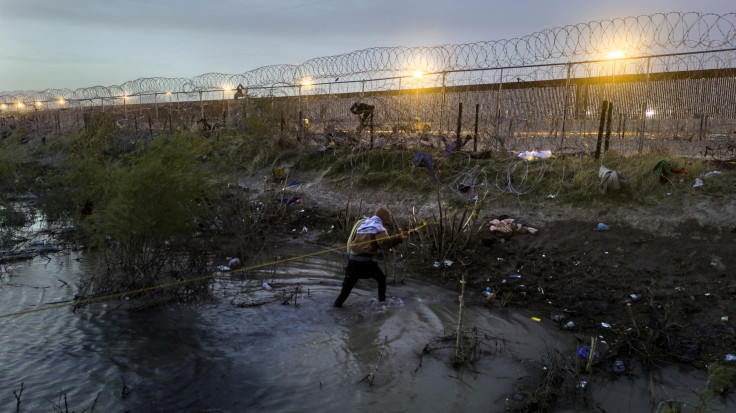
President-elect Donald Trump is doubling down on his mass deportation plans, which he promises will be the largest operation in American history, ahead of his inauguration on Jan. 20. Throughout his political career, particularly during the 2024 presidential campaign cycle, he has promised to start deporting criminals who have crossed the border illegally. But as he continues spewing hateful rhetoric towards migrants, who is actually being deterred from crossing the border? Experts say it is likely not just criminals.
Back in November, right after declaring electoral victory, Trump took to social media to confirm he would start mass deportations as soon as he entered office. In his platform, Truth Social, he even confirmed that the incoming administration is preparing to use "military assets" to deport these migrants, replying "TRUE!!!" to a post from Judicial Watch's Tom Fitton on the matter.
He communicated a similar message throughout the campaign trail.
"On Day 1, I will launch the largest deportation program in American history to get criminals out," he said during a rally at Madison Square Garden in the closing days of the presidential race. "I will rescue every city and town that has been invaded and conquered, and we will put these vicious and bloodthirsty criminals in jail, then kick them the hell out of our country as fast as possible."
But when it comes to immigration crackdown, Trump's rhetoric may not just be deterring criminals from crossing the border, but also asylum seekers and those escaping their homes in search for a better life north of the border.
Marina Shepelsky, a seasoned immigration attorney and an immigrant herself, points out that while immigrants with criminal records are going to have a high deportation risk under the Trump administration, they are not the only ones who will be suffering the consequences of mass deportations.
"Under Trump's immigration policy, individuals with criminal records— regardless of the severity— are at higher risk for deportation," Shepelsky told The Latin Times. "This includes immigrants convicted of felonies, misdemeanors, or even minor infractions.
However, other immigrants with no criminal charges or convictions pose a similarly high risk, according to Shepelsky.
"One of the most vulnerable categories of immigrants are those who entered the U.S. without inspections," she continued. "This means they crossed the border without any official authorization. These individuals are often considered unlawfully present in the country due to the lack of entry records of visas. Under Trump's policies, individuals who enter the country without following the proper legal procedures face a heightened risk of deportation.
Likewise, Rosanna Berardi, a Managing Partner at Berardi Immigration Law, agrees, adding that the President-elect is seemingly focusing on "enforcement," making migrants of all backgrounds subject to his policies while preventing large waves of immigration— as seen throughout the Biden administration— from occurring, she predicts.
"Whether it is a criminal or asylum applicant, the message from the administration is one of enforcement," Berardi said. "The entire world is familiar with President Trump's immigration rhetoric— from the 'wall' to 'mass deportations.' [The rhetoric and policies] will likely deter the mass migration of people we saw during the Biden administration."
But Ellen Sullivan, an attorney and owner of Cambridge Immigration Law, points out that there are already laws regarding immigrants committing crimes. Currently, any immigrant— including legal U.S. permanent residents— who commits serious or violent crimes— such as aggravated felonies, drug possession or drunk driving— can be arrested and eventually deported. Additionally, just this week, the Republican-led House of Representatives passed the Laken Riley Act, which seeks to target undocumented migrants for deportation if they're charged with nonviolent crimes such as shoplifting. It is set to go before the Senate on Friday.
That is why, Sullivan suggests also taking a look at migrants already in the communities and protecting them.
"What I'm more concerned about is what about all the non-citizens in the United States who are already here and are part of our communities, who are part of our lives, who contribute to our culture and our economy," she said. "How are they going to be affected [by the Trump administration's policies]? And I can't see any of this being very positive."
© 2025 Latin Times. All rights reserved. Do not reproduce without permission.




